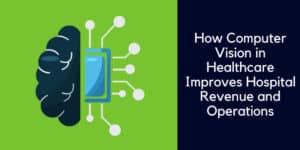What’s inside:
In this article, we highlight how AI and automation technologies are revolutionizing healthcare supply chain and inventory inventory management.
Topics covered in this article:
- The role of AI and digital technology in enhancing inventory management.
- Explore real-world applications of AI, RFID, machine learning, and image recognition technologies
- Learn about the game-changing benefits of AI and advanced technology in healthcare inventory management
- Unveil the impact of AI on hospital operational decisions
Find out how healthcare inventory management systems with AI are transforming healthcare management.
“Across many industries, digitally transforming the supply chain has been shown to
reduce process costs by 50% and
increase revenue by 20%; hospitals are no exception”
As healthcare providers strive to optimize operational efficiency, reduce costs, and ensure uninterrupted patient care, the role of healthcare inventory management systems with AI and advanced automation are transforming healthcare delivery.
How technology is transforming the healthcare supply chain
The healthcare supply chain is in the middle of a dramatic transformation, as technology makes a significant impact on the planning and management of hospital medical inventory.
Hospital supply chain management traditionally involved high levels of manual labor and was prone to inaccuracy and inefficiency. But now technology is turning routine, mundane and manual supply chain duties into automated tasks, while at the same time improving efficiency, boosting productivity and reducing costs.
Let’s look at the impact of healthcare inventory management systems with AI
Healthcare management is complex, labor intensive and time consuming. Utilizing new technology can lighten the load.
There are several functions that can be optimized by using AI and automation technology, for example:
- Automated Inventory Management: Automated inventory management solutions use technology such as RFID sensors and tags to provide real-time inventory vision, track inventory levels and monitor expiration dates of medical devices, implants, tissue, bone, and consumables. Hospitals, health systems and ambulatory care providers using advanced technology to manage their inventory are seeing improved efficiency, reduced waste, plus more efficient stock control and replenishment.
- Automated Replenishment: Automated Par-level and Kanban systems use algorithms and AI to monitor the inventory and predict demand. This technology is used to automatically restock products when the system tells them that the order point has been reached – so it’s the interplay between accurate, timely data collection and analysis that makes auto-replenishment happen.
- Automated UDI Management: Managing UDI ensures full FDA UDI compliance and supports patient safety.
- Automated Charge Capture: AI vision is spearheading OR charge capture efficiency using camera technology to capture products and AI to manage digital data.
- Automated Expiry and Recall Management: Tackle excess stock and wastage by using AI data for better expiry management and inventory control.
- Automated Vendor Management: Vendor contracts can be monitored using AI technology to analyze purchasing data and look for opportunities to reduce costs. This valuable data is a resource for contract negotiations, helping to secure better deals.

Let’s dig a bit deeper and take a look at the different types of technology being used and find out how it is being applied to the day-to-day management of medical inventory.
How advanced digital technologies are being used in healthcare inventory management
From AI-powered analytics to RFID tracking systems, innovative solutions are optimizing stock levels, reducing costs, and enhancing operational efficiency.
In this table, explore the diverse range of digital technologies reshaping the healthcare industry, enabling providers to navigate supply chain challenges with greater agility.
| Technology used | Benefits | Example of product |
| RFID tags and sensors | Automated inventory tracking, monitoring and control. Real-time inventory vision. | · TotalSense smart implant tracking cabinet
· Scan & Restock – Kanban automation · Narcotics Cabinet |
| Algorithms, Artificial Intelligence (AI) and Machine Learning (ML) | Automated purchase requisitions based on minimum levels being reached. Prompt and accurate restocks prevent surpluses and stockouts. | · TotalSense smart implant tracking
· Wireless Weight-Based PAR Bin · Narcotics Cabinet |
| Algorithms, Artificial Intelligence (AI), Machine Learning and Analytics | Optimizing inventory levels through the analysis of historical data to identify supply chain inefficiencies and predict future demand, including anticipated fluctuations. | · IDENTIPlatform |
| Image Recognition Technology | Capturing full and accurate product details at the point of care.
Many hospitals fail to record full and accurate usage data at the point of care, by better use of technology providers can plug the data gaps that cause under reimbursement. |
· Snap&Go |
| Neural Language Processing (NLP) | Interpretation of hand written sheets into a digital record.
One example is the digitalization of hand written implant sheets to ensure every nut, bolt and screw is recorded on the EHR |
· Snap&Go |
| Cloud computing | To centralize and securely share critical inventory data with supply chain stakeholders for improved transparency, collaboration and improved decision-making.
Cloud software facilitates the simple management of complex data and enables scalability, flexibility, and cost-effectiveness in managing complex supply chain operations. |
· IDENTIPlatform |
| Internet of Things (IoT) | Gathering real-time data to establish tracking and usage of inventory.
Mobile inventory management reduces labor and add accuracy into the equation. |
· TotalSense Mobile |
Benefits of healthcare inventory management systems with AI on supply chain management
Healthcare providers using AI and other automation technologies to manage the healthcare supply chain will see many of the following benefits:
Enhanced supply chain efficiency
As we have stated, utilizing automation and AI in healthcare organizations can optimize supply chain management processes, minimizing manual labor and enhancing efficiency.
Easy location of items: When automation is used for the collection of supply chain data and real-time inventory information is available to staff, it significantly reduces the amount of time it takes to locate the items needed. Nurses report back that it completely removes all the running around ‘hunting for stock’ that previously took up much of their day.
Usage tracking: Collecting accurate inventory data in OR and procedure rooms is challenging. Nurses, who are responsible for materials management behind the ‘red line’, face the task of monitoring patients, supporting the clinical team, and recording usage. With so much to focus on, the last thing nurses need is inadequate tools for data-collection at the point of care, but sadly that’s the norm, with many items failing to scan or achieve manual entry onto the system. System limitations lead to the non-documentation of items during surgery. When this happens the healthcare provider has to rely on post-surgery administration or documentation audits to pick up any errors or omissions. But technology is proving to be a gamechanger here with a new generation of surgical data capture finally facilitating 100% item capture.
Inventory management: When end-to-end inventory tracking is achieved, including consumption data, the logistics team have all the information they need to ensure prompt restocks. This precise, demand-driven inventory management prevents stockouts, minimizes waste and reduces labor.
Reduced Costs
Technology provides hospitals and ambulatory care providers with accurate and up-to-date inventory information so that they can achieve accurate restocks based on real usage data. This prevents overstocking, stockouts, and wastage, leading to optimal inventory management and cost reductions, as well as the efficient and timely provision of inventory for scheduled surgeries.
Advanced analytics and machine learning algorithms help healthcare providers to identify trends and patterns in the medical supply chain so that they can leverage these predictive insights to anticipate fluctuating needs.
Through the utilization of digital technologies, healthcare providers can optimize inventory management and leverage accurate demand forecasting. Optimized inventory management plays a vital role in mitigating the impact of cancelled or delayed surgeries due to missing inventory and also reduces the reliance on expensive, just-in-time deliveries.
Inventory data helps healthcare organizations to make more informed, data-driven decisions regarding procurement, which will result in reduced costs.

Improved Patient Outcomes
There’s a tendency for us to look at materials management as being an operational process that is removed from clinical activities, but the fact is that it is a key factor in patient care. One of the most significant benefits of automation and AI in healthcare supply chain management is the potential to improve patient outcomes. When a hospital or ASC is able to ensure the continuous availability of medical supplies and equipment, they are supporting the delivery of prompt and high-quality patient care.
Achieving an optimal inventory eliminates the risks associated with cancelled, delayed or disrupted surgeries, as the right type, size and brands of medical inventory are available upon request.
Ao automation and AI can help to prevent delays in surgery or disruptions in treatment, but it can also act as a safety net too. AI powered software is not giving pre-consumption expiry and recall alerts to nurses to prevent ‘never events’.
It can reduce the risk of errors and improve overall patient satisfaction. In short, supply chain automation is one of the foundations of high-quality patient care.
Reduced procurement administration
The implementation of optimized inventory management significantly reduces procurement administration, leading to improved efficiency and cost savings.
By leveraging AI and automation, organizations can streamline the entire procurement process, eliminating manual and time-consuming tasks. With AI-powered analytics, companies can accurately forecast demand, allowing for more precise and fewer orders. This reduction in order volume translates to less administrative work related to order placement, tracking, and processing.
Ultimately, the reduction in procurement administration not only saves costs but also contributes to improved clinical and operational efficiency, enabling healthcare organizations to focus on delivering quality care to patients while optimizing their resource allocation.
Enhanced Data Analytics
Automation and AI can provide valuable insights into supply chain management data, helping healthcare facilities to identify trends, track performance, and make informed decisions.
Healthcare inventory management systems with AI is changing the game, for example:
| AI demand forecasting | Predictive Analytics can wade through vast amounts of historical data and review healthcare trends to help providers predict future demand for supplies and equipment.
Healthcare inventory management systems with AI deliver valuable data allows healthcare facilities to plan procurement and avoid stockouts or overstocking. |
| AI inventory optimization | AI systems can provide medical inventory reports and data insights that help healthcare providers to optimize their medical inventory, identifying slow-moving or obsolete stock, and determining appropriate reorder points.
Optimized inventory levels can be achieved by analyzing purchase and usage history, and automating expiry and recall management. This helps hospitals to reduce write-offs and reduce their inventory.
AI insights help management get the balance right between minimizing costs and optimizing inventory. |
| Image recognition and AI for revenue optimization | Image recognition technology can be used as a more efficient method of capturing usage documentation in surgery.
This is a common area of OR data leakage that can result in incomplete or inaccurate medical billing and missed revenue.
Healthcare inventory management systems with AI and computer vision are ensuring full data integrity at the point of use. |
| AI supply chain optimization | Analysis of inventory, purchasing, and delivery to identify opportunities for process improvement, cost reduction, and efficiency gains.
|
| Preference card insights: | Health providers have thousands of physician preference cards. These detail the medical supply expectations of individual physicians for specific procedures.
These cards contain expensive medical inventory and often there is great variation on the types and brands of implants used by individual physicians. This variation is a great opportunity for hospitals and ambulatory care providers to look at standardization of physician preference items (PPI).
AI can do the mundane and time- consuming task of checking these cards, analyzing product mixes and finding standardization opportunities. It can also find all the duplicate or out-of-date cards to clean up and streamline the records. |
| Supplier performance insights: | AI-powered inventory management systems can evaluate supplier performance based on metrics such as delivery timeliness, quality, and pricing.
Healthcare inventory management systems with A provide insights that help management make data-driven decisions about supplier selection, renegotiating contracts, or identifying potential risks in the supply chain. |
| Cost optimization insights: | Automated AI inventory management systems can identify cost-saving opportunities, such as consolidating orders or reducing excess inventory.
By analyzing various cost drivers, these insights help management make data-backed decisions to optimize operational costs and improve profitability. |
Future proof your digital inventory management solution
It’s important to remember that organizations grow and any new solution you bring on board needs to tick two boxes:
- Scalability
- Interoperability
Your Healthcare inventory management systems with AI needs to inclue healthcare data collection tools and the software needs to be able to scale as your organization grows It must be interoperable with core hospital management systems such as the ERP, EHR and MMIS. It is crucial that data isn’t stuck in silos but can be shared across the organization and will stakeholders too.
The transformative power of AI and digital technology in healthcare
Healthcare inventory management systems with AI are harnessing the power of AI analytics, healthcare providers can unlock significant benefits and optimize their operations.
A Harvard Business Review article on business transformation in the healthcare sector included comments on supply chain management*1. It provided some useful facts and figures on the impact that technological solutions can have on optimizing the supply chain:
- In 2018 US hospitals spent an average of $11.9 million on medical and surgical supplies, which equates to around one third of their total operating expenses.
- Digital transformation has been shown to reduce process costs by 50% and increase revenue by 20% in many industries, and hospitals have much to gain.

This article has looked at many ways of reducing healthcare supply chain costs and optimizing income to boost performance and improve hospital margins.
Overall, the benefits of automation and AI in healthcare supply chain management are significant and far-reaching. By improving efficiency, reducing costs, and enhancing patient outcomes, these technologies have the potential to transform the healthcare industry and help healthcare facilities to provide better care to patients.
As technology continues to advance, we can expect to see even more innovative solutions for healthcare supply chain management in the future. Organizations embracing AI and other digital technologies will experience game-changing advantages that will support improved growth.
AI is everywhere.
It’s today’s reality.
This article was researched and partially written using AI generative predictive technology.
AI is our partner. It is becoming the new norm. We either adapt, or risk being left behind.
Find out about IDENTI’s healthcare inventory management systems with AI.
*1 How Digital Transformation Can Improve Hospitals’ Operational Decisions (hbr.org)
Healthcare inventory management systems with AI
Healthcare inventory management systems with AI
Healthcare inventory management systems with AI
Healthcare inventory management systems with AI
Healthcare inventory management systems with AI
Healthcare inventory management systems with AI
Healthcare inventory management systems with AI
Healthcare inventory management systems with AI






